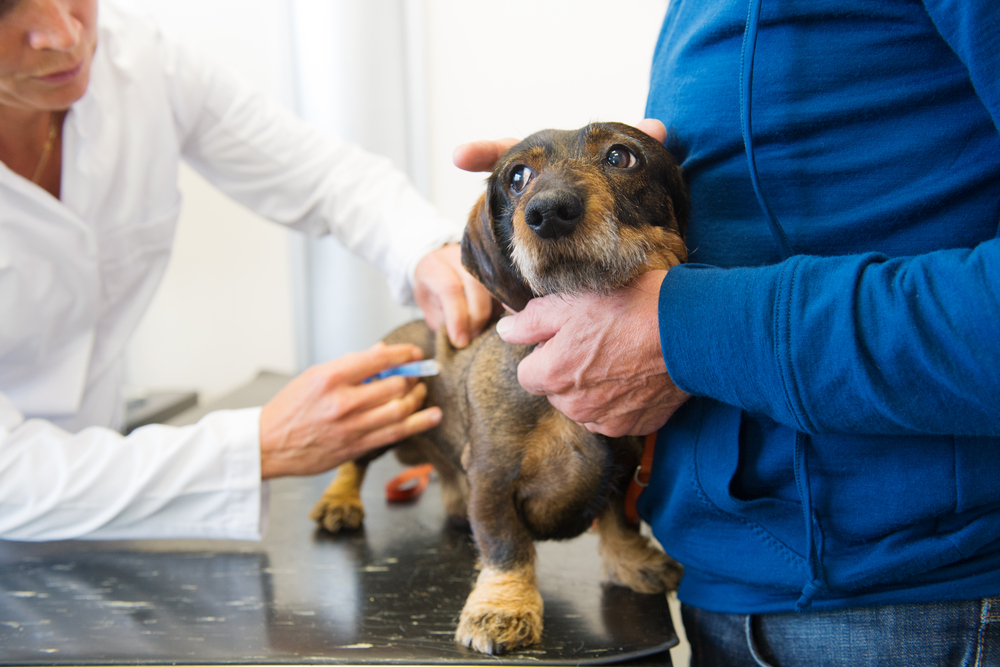You may have heard about heartworm disease from your veterinarian, and you may know that you can prevent your pets from heartworm infection, but do you know about heartworms themselves? Do you know that a heartworm is a parasitic worm that lives inside your dog’s heart and can cause deadly heartworm disease? Read the letter from a heartworm living in Teddy’s heart. Teddy is a 4-year-old dachshund whose pet parents stopped giving him his heartworm preventive because, in the chaos of normal life, they forgot to refill his prescription.
Dear Teddy’s Parents:
As I lie here in Teddy’s heart, my foot-long worm body wriggling in his flowing blood, I have to wonder how I was lucky enough to end up here. Most heartworms cannot elaborate on their journey, because they die before they can become adults from the monthly preventive medications pet parents give to their pets. The Twin Maples Veterinary Hospital team had educated Teddy’s family about mosquitoes that infect dogs and cats with heartworms like me, and why year-round protection is vital but, unfortunately, they forgot to replenish his preventive supply.
From my understanding, my host Teddy was a perfectly healthy dog prior to my arrival. At his last annual exam, the Twin Maples team gave Teddy a clean bill of health, and a new prescription for a year’s supply of a monthly heartworm prevention product. Teddy’s pet parents decided to purchase only one month’s dose, and planned on returning for more in the next few weeks. Like most people, Teddy’s family have a busy life, with work, school, and extracurricular activities, and they never made it back in for the remaining 11 doses.
In Ohio, where mosquitoes can be found during most months of the year, a mosquito quickly found Teddy, and injected me, along with my baby brothers and sisters, into his body. We are a precocious species, and we grow into foot-long adults by about 6 months of age, and take up residence in our host. My family now lives in Teddy’s heart, but not every heartworm lives like we do. Most heartworm families get caught up in the major blood vessels, causing fluid to back up into the pet’s lungs. In other dogs, heartworms get into the lungs, causing inflammation and lung disease. In both cases, dogs can start coughing, have difficulty breathing, or develop clotting abnormalities. Big families like mine can put strain on the host’s heart. Worst of all for us, some of us die and then we can cause a dangerous pulmonary embolism. So, we definitely pose a health risk—and can sometimes be fatal—for pets.
It’s difficult for me to see what happens to dogs infected with heartworms like me, because we are living our normal lives. But I do sometimes think it is unfortunate that dogs and cats suffer because of us, when we don’t mean any harm.
Today, the Twin Maples team gave Teddy his annual exam, and his heartworm test showed positive. When Teddy’s pet parents were asked about his heartworm prevention, they spilled the beans about forgetting his monthly protection, and felt horrible about not making his health a top priority.
Teddy’s pet parents were devastated that he had been diagnosed with a dangerous condition they could have prevented. Fortunately, heartworm disease is treatable, but it is a long, difficult process for dogs. Treatment will take a few months, to slowly destroy myself and my heartworm family, and Teddy will be severely restricted from any activity during that time, which will be no fun for such an active dog. But, he will be at risk of a life-threatening obstruction from the dead worms if he doesn’t do what he’s told.
I am hoping this letter reaches pet parents everywhere. I feel like an innocent victim here, but I want owners like Teddy’s to know how heartworms can affect their beloved dogs, and that prevention is less difficult, and less expensive, for their pet, compared with the dangers of an infection and the subsequent treatment.
Yours,
Heartworm

At Twin Maples, we recommend that all dogs be given a yearly injectable heartworm preventive, or year-round, monthly oral heartworm preventive medication. Cats can also develop significant lung disease from heartworm infection, but no treatment is available for cats, and treatment focuses only on managing the inflammation, so preventives are vital.
Schedule your pet’s physical exam with us, so we can discuss heartworm prevention, and help you choose the best preventive for your pet.









Leave A Comment